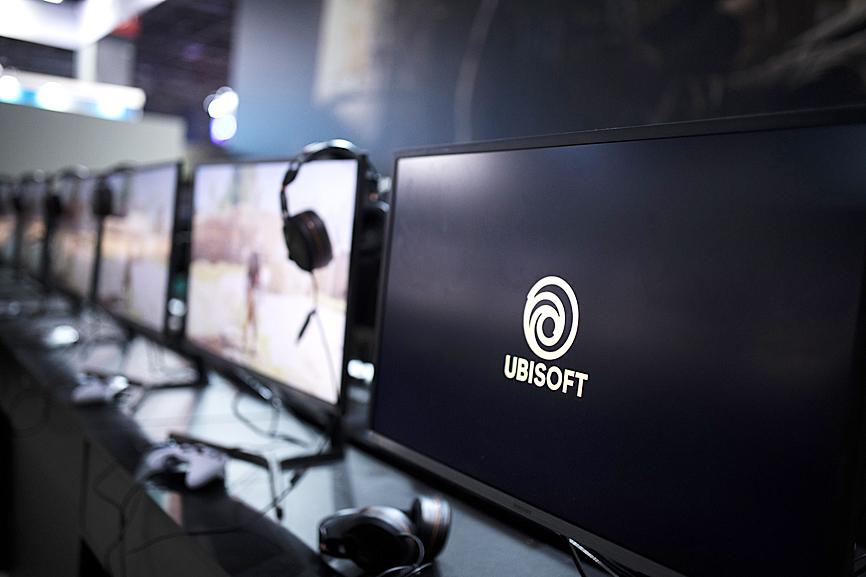French gaming giant Ubisoft SA is parting ways with its creative director and two other executives and promising zero tolerance for “toxic” staff behavior following an internal investigation of misconduct and media reports of sexual harassment and other workplace abuse.
In a statement on Sunday, Ubisoft CEO Yves Guillemot said the developer of Assassin’s Creed and other games “has fallen short in its obligation to guarantee a safe and inclusive workplace environment for its employees.”
“This is unacceptable, as toxic behaviors are in direct contrast to values on which I have never compromised — and never will,” Guillemot said.

Photo: AP
Ubisoft announced the immediate resignation of Serge Hascoet as the firm’s powerful chief creative officer.
Hascoet joined Ubisoft in 1987, the year after Guillemot founded the company with his four brothers. Ubisoft had previously described Hascoet as its “creative leader” whose “unique vision has infused every game released by the company.”
The director of Ubisoft’s Canadian studios, Yannis Mallat, is also leaving immediately, because “recent allegations that have come to light in Canada against multiple employees make it impossible for him to continue in this position,” the company said.
Cecile Cornet is being replaced as Ubisoft’s global head of human resources.
Guillemot also promised further “profound changes across the company to improve and strengthen our workplace culture.”
Investigations by French daily Liberation and other media reports have pointed to alleged sexual harassment targeting female employees, and other workplace misconduct, and a growing willingness by some in the industry to speak up against abuses in the wake of the #MeToo movement.
The management shake-up at Ubisoft follows its announcement last month of an internal investigation and an apology “to everyone affected by this.”
“We must do better,” it said.

Nvidia Corp CEO Jensen Huang (黃仁勳) today announced that his company has selected "Beitou Shilin" in Taipei for its new Taiwan office, called Nvidia Constellation, putting an end to months of speculation. Industry sources have said that the tech giant has been eyeing the Beitou Shilin Science Park as the site of its new overseas headquarters, and speculated that the new headquarters would be built on two plots of land designated as "T17" and "T18," which span 3.89 hectares in the park. "I think it's time for us to reveal one of the largest products we've ever built," Huang said near the

China yesterday announced anti-dumping duties as high as 74.9 percent on imports of polyoxymethylene (POM) copolymers, a type of engineering plastic, from Taiwan, the US, the EU and Japan. The Chinese Ministry of Commerce’s findings conclude a probe launched in May last year, shortly after the US sharply increased tariffs on Chinese electric vehicles, computer chips and other imports. POM copolymers can partially replace metals such as copper and zinc, and have various applications, including in auto parts, electronics and medical equipment, the Chinese ministry has said. In January, it said initial investigations had determined that dumping was taking place, and implemented preliminary

Intel Corp yesterday reinforced its determination to strengthen its partnerships with Taiwan’s ecosystem partners including original-electronic-manufacturing (OEM) companies such as Hon Hai Precision Industry Co (鴻海精密) and chipmaker United Microelectronics Corp (UMC, 聯電). “Tonight marks a new beginning. We renew our new partnership with Taiwan ecosystem,” Intel new chief executive officer Tan Lip-bu (陳立武) said at a dinner with representatives from the company’s local partners, celebrating the 40th anniversary of the US chip giant’s presence in Taiwan. Tan took the reins at Intel six weeks ago aiming to reform the chipmaker and revive its past glory. This is the first time Tan

CUSTOMERS’ BURDEN: TSMC already has operations in the US and is a foundry, so any tariff increase would mostly affect US customers, not the company, the minister said Taiwanese manufacturers are “not afraid” of US tariffs, but are concerned about being affected more heavily than regional economic competitors Japan and South Korea, Minister of Economic Affairs J.W. Kuo (郭智輝) said. “Taiwan has many advantages that other countries do not have, the most notable of which is its semiconductor ecosystem,” Kuo said. The US “must rely on Taiwan” to boost its microchip manufacturing capacities, Kuo said in an interview ahead of his one-year anniversary in office tomorrow. Taiwan has submitted a position paper under Section 232 of the US Trade Expansion Act to explain the “complementary relationship” between Taiwan and the US